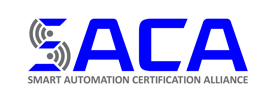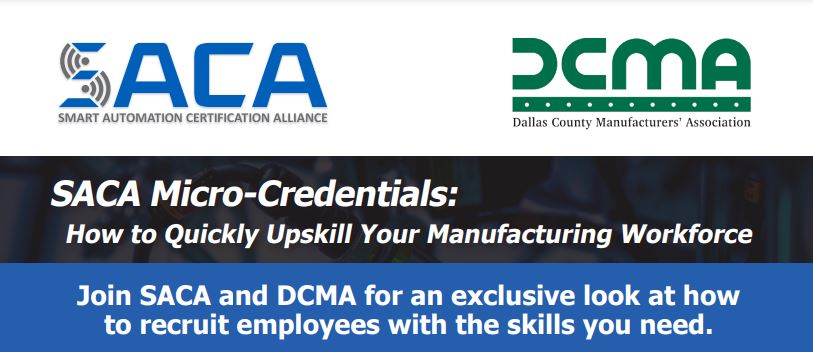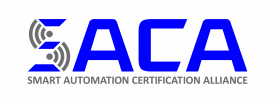SACA & DCMA to Host Manufacturing Recruiting Technical Work Group
The Smart Automation Certification Alliance (SACA) is pleased to announce that it is partnering with the Dallas County Manufacturers’ Association to host an exclusive Manufacturing Recruiting Technical Work Group meeting on April 5th, 2024, in Garland, Texas.
WHO IS IT FOR?
The technical work group will identify the competencies employers are seeking when they hire and promote employees in these technical positions. Ideal participants include people responsible for operations, maintenance, process control and quality. This event is open to all industrial employers. There is no cost to attend. Continental breakfast is included.
WHO WILL BE PRESENTING
Get first access to updates from SACA Executive Director Jim Wall on new credentials, occupational alignment and further expansion plans. Guest speakers will share insights into topics like K-12 pathways, industry-education alignment, statewide adoption of certifications, and more.
WHAT IS THE NEED?
Are you struggling to find workers for your open positions? Are you investing in automation and now need to upskill/reskill your employees? Do you want a workplace culture where people seek to learn, grow their skills and stick around long-term?
Discover how industrial employers are hiring, training and retaining highly-skilled workers using micro-credentials from the Smart Automation Certification Alliance
- Learn about the only Industry 4.0 certifications developed by employers, for employers
- Get a roadmap to align highly-targeted micro-credentials with the exact skills incumbent workers in your company need
- Discover how to recruit SACA-certified employees graduating from advanced manufacturing programs
Interested? Here are the details:
SACA & DCMA Manufacturing Recruiting Technical Work Group
April 5, 2024
Dallas College – Garland Center
675 West Walnut Street, Garland, Texas 75040
Click here to download a flyer with the agenda.
Plan to attend? RSVP here.
About SACA
SACA sits at the forefront of the effort to certify students and workers who demonstrate the required knowledge and hands-on smart automation skills employers so desperately need. SACA’s certifications were developed in conjunction with industry partners who could speak from experience about their needs when it comes to workers able to work alongside a variety of advanced automation technologies.
SACA offers a wide variety of certifications in popular industrial skill areas, including certifications at the Associate, Specialist, and Professional level. For those wishing to focus on building a strong foundation of skills employers need, SACA also offers many micro-credentials that allow students and workers to add certifications as they master new areas.
For workers, SACA certifications can help market their smart automation skills to potential employers. For those employers, SACA certifications represent confirmation that a worker has the skills to hit the ground running in the workplace. To learn more about Industry 4.0 certifications and how SACA can help both future workers and industrial employers begin the task of bridging the Industry 4.0 skills gap, contact SACA for more information.
- Published in News
Automation and the Skills Gap: Hiring for the Present and the Future
Looking to add a highly skilled automation engineer to your company? Finding one may be more difficult than you anticipate—and not for the reason you might think. Although highly skilled workers of all kinds appear to be in short supply these days, the real problem may lie in how employers are communicating their needs to potential workers.
According to a recent IndustryWeek article by Ryan Secard, “[s]killed job candidates say it’s taking longer to find work, despite huge numbers of open positions in manufacturing, because hiring companies either don’t know what they want or can’t explain it to candidates.”
Could ineffective communication be responsible for making the skills gap even wider? According to Secard, “employers appear to be leaving a gap in the market between the open jobs they say they need to fill and how they’re explaining those opportunities to people seeking new positions.” Moreover, “[t]he issue companies are having with anticipating needed skills…is thanks to automation.”
For example, take a look at a common position many companies need to hire for on a regular basis: maintenance technician. Pretty straightforward, right? Not in today’s automated industrial world! As advanced automation technologies proliferate in the workplace, employers are left to guess about the future. Will they need more or fewer employees down the road? More importantly, what skills will their maintenance technicians need in six, twelve, or eighteen months from now?
Compounding these issues is the fact that more than half of job seekers in a recent survey indicated that they believed “a lack of skills is holding [them] back from finding meaningful employment.” Again, communication could be key, as many job seekers report that job descriptions “often include unrealistic minimum qualifications for relatively low positions.”
What can companies do to improve their communications with potential workers and begin filling the open positions they have? First, they must focus on developing a better understanding of the skills they need to hire for. With so many “job candidates confused and depressed,” “the onus is on companies to articulate the skills they’re looking for.”
Secard’s article notes a couple of approaches companies can take. For example, he points out Siemens AG’s focus on mechatronics skills to find versatile engineers. The idea is that “[a]n engineer trained in mechatronics would be capable with mechanical and electrical engineering, along with enough software engineering to implement both.”
An alternative approach can be found in Deloitte’s use of job canvases. “An example job canvas is split into columns: One for core competencies for the role, two columns for skills or programs expected but which may increase or decrease in importance for the role, and a fourth column specifically dedicated to skills the company anticipates will be necessary for the role in the future.”
How might a job canvas look for a manufacturing engineer position? “The first column may look similar to a traditional job posting…[listing] technical writing, systems knowledge, and product engineering.” “But the last column gives a blueprint for at least how the company expects the role to evolve — in this case, the theoretical manufacturing engineer should expect to later become skilled in data driven decision making, digital twins, and robotics.”
As companies continue to struggle to hire the highly skilled workers they need for a modern industrial workplace that’s more automated than ever, it’s important to remember that there’s yet another approach that companies can take. Look for candidates with industry-standard credentials that prove they already possess the advanced automation skills needed to thrive. For example, if workers possess a certification from the Smart Automation Certification Alliance (SACA), employers can feel confident they’ve already proven they have the knowledge and hands-on skills needed for working with advanced smart automation technologies. SACA has been hard at work collaborating with industry leaders to develop a wide variety of industry-standard certifications that will help employers find workers who possess the advanced connected-systems skills they need to take their businesses to the next level. Be sure to check out SACA and all it has to offer!
- Published in News




